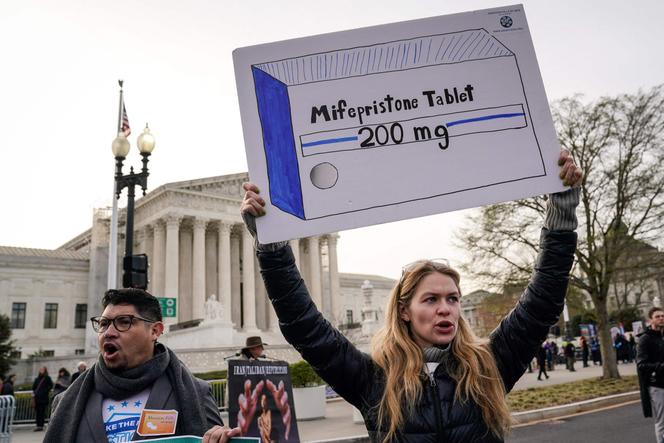


It's a relief for the pro-abortion camp in the United States. Nearly two years after striking down the federal constitutional right to abortion, the Supreme Court voted unanimously on Thursday, June 13, to preserve American women's access to mifepristone, the pill used in nearly two-thirds of abortions in the US.
The case was brought before the country's highest court by the Biden administration following a complaint filed in 2022 by a group of anti-abortion doctors known as the Alliance for Hippocratic Medicine. They argued that the Food and Drug Administration (FDA), the agency responsible for regulating drugs, had approved the online sale of mifepristone without sufficient safeguards for patients' health. An ultraconservative Texas judge ruled in their favor.
Mifepristone (also known as RU-486) was approved by the FDA in 2000 for pregnancies of less than seven weeks. It was extended to 10 weeks in 2016. By December 2021, the agency had removed the requirement to obtain a prescription in person, effectively authorizing online selling and shipment of the drug by mail.
Following the Supreme Court's decision on June 24, 2022, to send the issue of abortion legalization back to the states, access to mifepristone via the internet inflamed the conservative movement, which believed it had struck a decisive blow against abortion through the courts. Since then, thousands of women have been able to circumvent the almost total ban on abortion in some 20 states.
In its decision, made unanimously by all nine justices, the Supreme Court found that the Alliance for Hippocratic Medicine did not have the "standing" ("legitimacy to act") necessary to be able to take its case to the federal courts. In other words, it had not demonstrated that its members were suffering personal injury as a result of the measure they were challenging.
The decision points out that the plaintiffs do not themselves prescribe mifepristone and that federal law already protects practitioners who, for reasons of personal conscience, refuse to perform abortions. "A plaintiff's desire to make a drug less available for others does not establish standing to sue," writes conservative Judge Brett Kavanaugh, on behalf of the Court. As an example, he cites the fact that emergency physicians cannot challenge in court government decisions on speed limits on the grounds that they would increase the number of accidents.
The Court's decision does not come as a complete surprise. As early as the hearing devoted to the case on March 26, many constitutional experts had raised the argument of the case's legitimacy. This reason for referral enabled the nine judges to avoid ruling on the merits of the case and to display a rare unanimity on a subject touching on social issues. The Court had also been called upon by the pharmaceutical industry and all the major medical associations to consider the precedent that would have been set if drug regulation by a federal agency became subject to political polarization.
You have 34.7% of this article left to read. The rest is for subscribers only.
